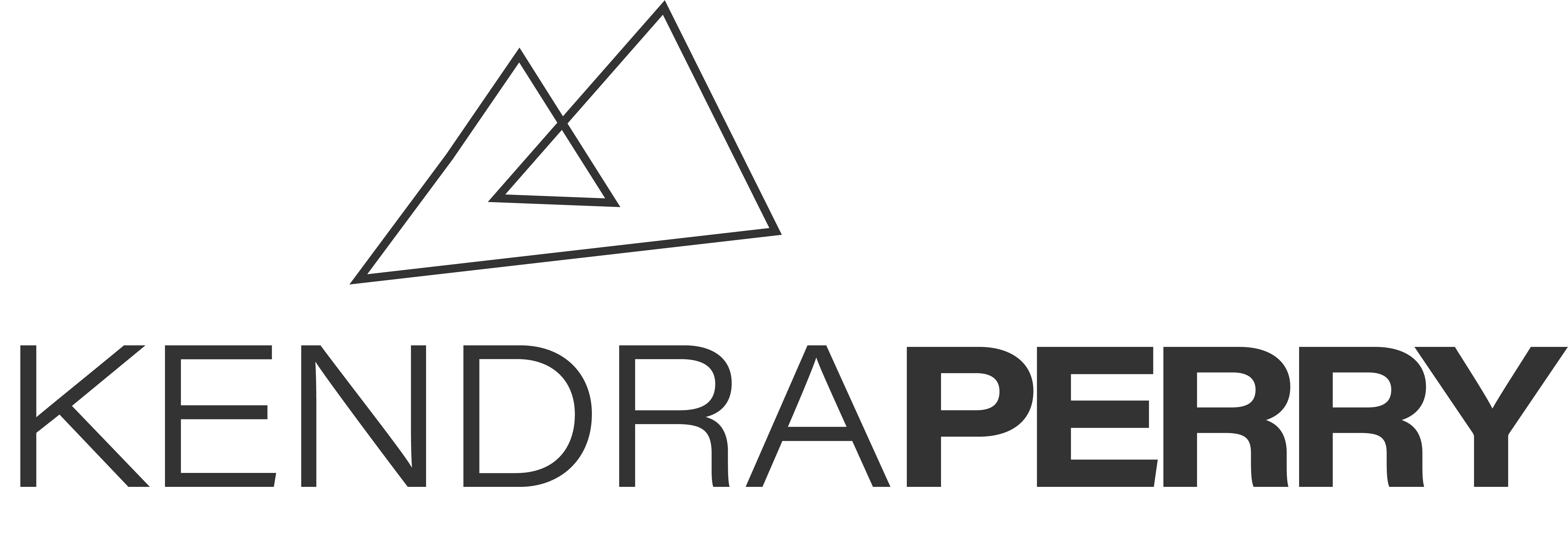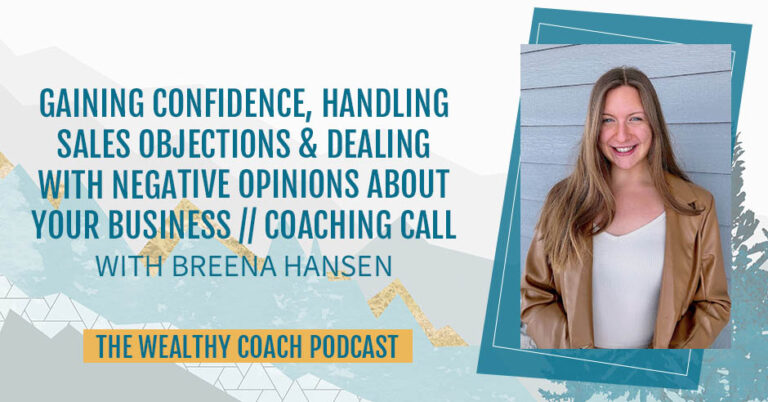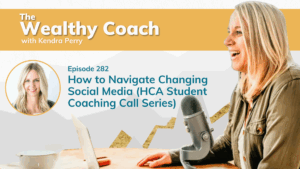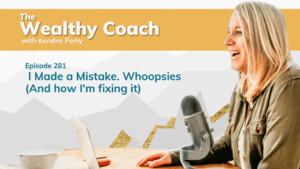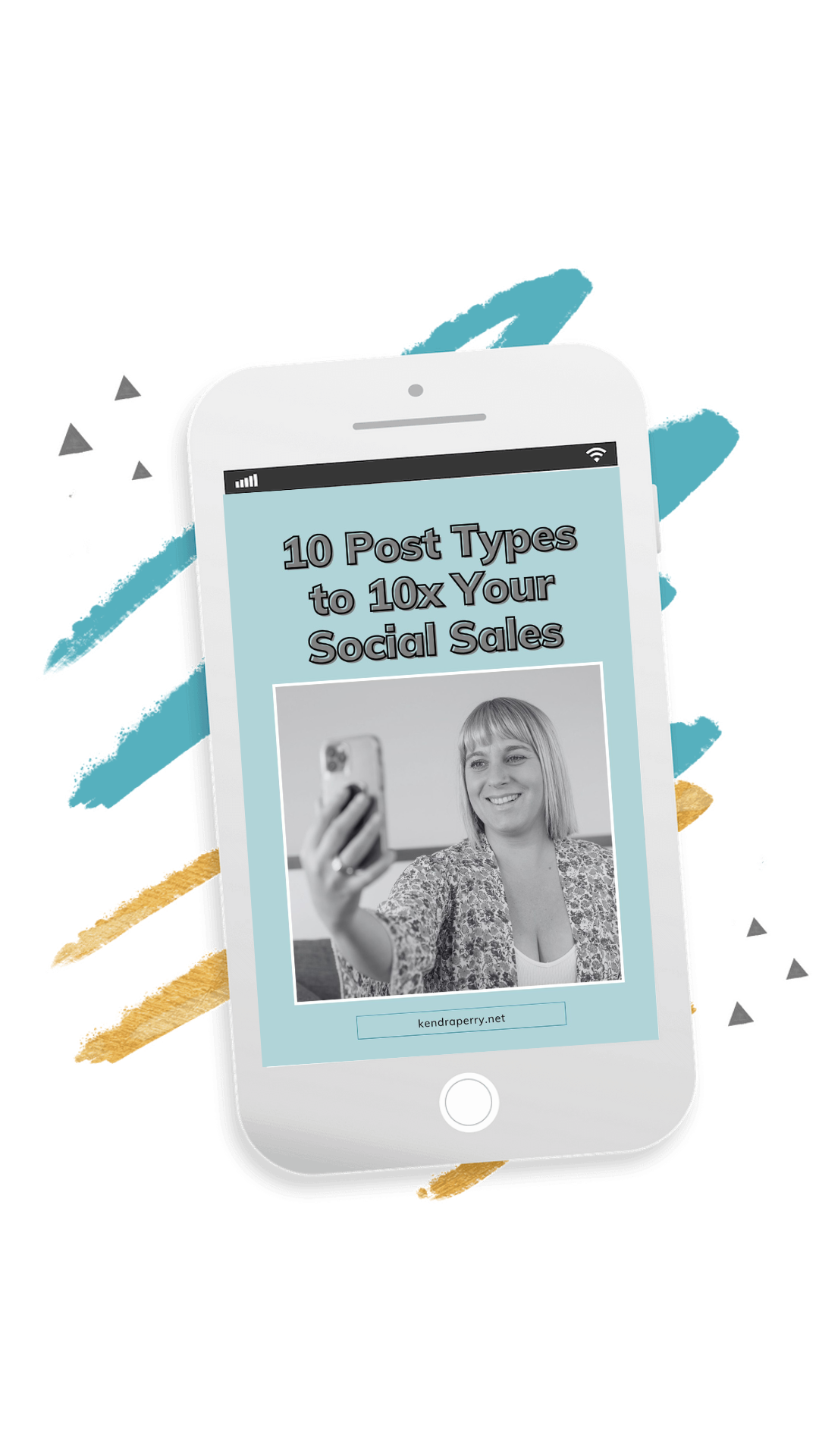Confidence is the currency of success, sales objections are mere stepping stones, and negative opinions fuel our transformation into unstoppable forces of entrepreneurial greatness. In this insightful session, our extraordinary guest, Breena Hansen, a certified period coach and expert in functional nutrition, joins us to discuss gaining unwavering confidence, mastering sales objections, and triumphing over negative opinions surrounding your business. Breena is no stranger to harsh rejections and opinions. She shares her experience when she struggled to gain confidence in her business, especially when dealing with unhelpful people. But through these experiences, Breena discovers mindset shifts that enable her to present her offers with conviction, authenticity, and enthusiasm regardless of what others say. And she’ll be sharing them with you today. Join us and discover how to tap into your inner potential, banish self-doubt, and radiate confidence that attracts loyal customers and lucrative opportunities. Tune in now!
—
Listen to the podcast here
Gaining Confidence, Handling Sales Objections & Dealing With Negative Opinions About Your Business // Coaching Call With Breena Hansen
In this episode, we are doing another coaching session with one of my health coach accelerator students. We are sitting down with Breena Hansen. She is a Period Coach for women in their 20s and 30s. We’re going to be diving into some of the issues she’s been having with her confidence, her struggles with handling objections on sales calls, and how to work through those. Also, how to deal with the judgment and negative opinions of friends, family, and even strangers when she talks about her business. This is a fun call with Breena. I know you’re going to love it, so let’s dive in.
—
Breena, can you tell me a little bit more about what you do and who you serve?
I am a functional diagnostic nutrition practitioner and period coach. I help women in their 20s and 30s who have period problems. I help them fix those period problems naturally so they can have PMS pain-free periods and feel their best all month long.
Your niche is very specific. It’s like music to my ears. I want this to be very casual. Why don’t you tell me what you need help with the most now and then we’ll dive into it?
The big issue that I am running into is people not necessarily knowing that health coaching is a thing and it can be so specific to their individual period problems. I know that a ton of people experience problems with their periods, but they’re still hesitant to embark on a four-month journey to help fix it. They accepted that it’s a normal part of life. My target group is a little younger, so they are not as financially stable. They trying to navigate those concerns on their part.
You say your target audience is younger, but you did say 20s and 30s. It’s a big group.
I have been attracting more on the twenties end. It’s a lot of my peers. I graduated college. A lot of people that I have been attracting are in college or getting out of college and say that that’s hindering them. I live in the US and attract a lot of people in the US. It’s so expensive to go to school. I am attracting people more on the lower end versus the higher 30s.
Would you feel comfortable targeting people even in their late twenties?
Yes, definitely.
I understand that in my younger twenties, I was a hot mess. I had no money, but in my later twenties, I was doing pretty good.
That’s the goal. The algorithm and the social media marketing’s been a little too specific. It’s been a lot of younger twenties that I’ve been attracting, but I’m willing and trying to get the older ones too.
When you say the people don’t understand that this is a problem that needs solving, is this specific to the people that you’re speaking with on a regular basis?
I love periods so I bring it up in casual conversation even if I’m not trying to like to get a client specifically. My mom had painful periods, so it’s who I am. I don’t think they can understand that it can change because the holistic view of health is still so new for a lot of people.
Are you speaking about people specifically who are talking online or random people who you’re talking about in conversation?
It’s more conversation-based and online presence. I haven’t got too much back and forth so far.
When we’re talking to people in everyday life, people will never understand what we do. I don’t even tell people much about what I do. Most of my close friends don’t even get what I do because they still think I have a hobby. With almost a decade in business, you understand that the people you’re bringing up in regular conversations are not people necessarily who are actively seeking a solution versus people who are online searching for a solution.
That’s something to remember because the other thing I wanted to talk to you about was the confidence in getting some noes in the professional setting. It’s like doing some discovery calls and getting noes. Also, casual conversation in public, but I’m trying to separate that out. When people tell you on day-to-day that what you’re doing seems a little crazy or that people will never pay for that much, it gets into your head when you go from your personal life to your professional life. That’s a good distinction that I think I need to work on to carry on my confidence in my job.
Would you ever pay for someone’s advice who’d never had a business?
No.
These people’s opinions don’t matter. It’s because they don’t understand. The online business world is still relatively new. People don’t get it, and it seems crazy. Also, some people are stuck in that status quo mindset and a lot of them feel uncomfortable with the unknown. A lot of people’s opinions are based on ignorance or want you to be safe. However, people in your everyday life and random people, you can’t listen to what they’re saying.
That’s something I have to work on. I’m one of those people pleasers. I have to make sure everyone’s vibing with what I’m doing. I have to separate them from the more professional setting. When you work for yourself in your home, there’s not a place of work you go to. Sometimes it’s hard to separate the personal and professional, but I think that’s key to that confidence.

What I will tell you is it’s not going to stop. Your friends and family are never going to get it. People still give me their opinion and business advice who don’t have businesses all the time. They ask me how my hobby going. Many years in business and I’m like, “It’s fine. Cool. Whatever.” I’m like, “I don’t care.” People don’t get it. That’s fine. I don’t get what they’re doing either, and I think what they’re doing is stupid so they can think what I’m doing is stupid too.
That’s a good way to look at it.
I want to come back to this piece that we started with you saying that you’re struggling to find people who want to fix the problem. I do wonder if you’ll be better served to serve a bit of an older age group. I’m basing it on my own experience of my crazy self of not caring and looking ahead, but when you’re starting to get with women in their thirties, they’re starting to think about fertility. That’s where issues with not having a period or whatever it is become a big deal.
That’s another mindset or a bird’s eye view look because I came from a campus where everyone’s telling me their periods suck and I can see that their habits aren’t leading to great menstrual health. I’m like, “I can help you,” but those people might not be quite ready to be helped yet. Being a little bit older would be beneficial.
You have to imagine that no one wants unsolicited advice. This is something I used to do. I’m like, “I have all this information. I want to help this person.” I would dump my unsolicited advice to people and they were like, “I don’t want that.” It’s hard to see that people are making bad choices and they’re suffering because of it and you know that there are things they can do to help, but if they’re not seeking it if they don’t want it, then they don’t want your advice and it’s best to put it elsewhere. It is a hard thing which I get. I’m not putting you in the spot because I was very much like that too.
That’s easy to do, for sure.
You mentioned in the form as well not knowing what to say on calls with people or in conversation with people. Can we talk a little bit more about that?
I’m not sure where that has stemmed from. It’s like a deeper thing because sometimes I get in my head and I need to have a plan for something. If something goes off plan, I get nervous. I feel like I don’t come back with thoughtful responses. It’s like, “That’s great or that sucks.” It is trying to get more comfortable, sit with the discomfort, and still lead. It’s my job as a coach to know all the things about periods, but I need to be able to help guide and converse with people in an appropriate manner.
Is this in regard to your coaching calls with people, or is this more in regard to sales calls?
It’s both. I get the same feeling with coaching calls. I am a little bit more comfortable with the coaching calls because you are talking about what I love. Most often, the people are also giving me good energy back and they’re like, “This is so cool. I can’t wait to change my things,” and that kind of thing. However, the sales call is a big commitment. I still have some of those questioning my confidence and I’m like, “Should I be taking these people’s money?” Those blocks that we talked about in HCA still come up.
On your sales call, since that seems to be what you’re struggling with, ballpark it. What percentage of the call do you feel like you’re talking compared to how much they’re talking?
I try to facilitate it with the script and have them talk, but sometimes when I get nervous, I talk. It’s probably a little bit more than I should be. Probably 50% or maybe me a little more than 50/50.
The great thing about sales calls is the less talking, you do the better. There’s been research that shows that in the most successful sales calls, the prospect speaks 70% of the time. How do you think you can get someone to talk more than you’re talking?
I went through the HCA as we know. Honestly, sometimes I get off kilter with that but maybe sticking to that wonderful script, mirroring back to them a little bit more, and digging into their pain points, like why they need help and what their life could look like if they change to make them, 1) Have them talk more and 2) Make them realize that this is something that they should do and feel comfortable doing.

You said something there. You asked them why, which what I’m trying to get to is questions. How do we get people to talk more? We’re curious and we ask questions. We can’t make anyone do anything. We can’t make anyone feel anything or see anything, but what we can do for people is hold space for them to be able to share their experiences. It can be just as simple. The mindset you go into the call with is important.
I know we talked about this, but it is that feeling or that energy of curiosity. It’s like a non-threatening energy state for both them and you because you’re just curious. When they’re talking, you can be like, “That’s interesting. Tell me more about that. Why do you say that? Can you give more details on that?” Sometimes, it’s about that because we want to get as much information from them as possible.
Oftentimes, what happens is when people realize they have a problem, it’s almost scaring them to say it out loud. For a lot of people, especially with health, maybe they never had the opportunity to speak like this because they went to their doctor, and the doctor is like, “Your time’s up. Your five minutes are up. You got to go.” They get shut down, especially with period problems. How does it feel to approach from a place of curiosity and try to question them more?
That feels good. The statement that you said about going to the doctor and maybe not feeling heard hit home and might be a good mental shift there because I’ve had that experience where I am experiencing X, Y, and Z. I get fifteen minutes with them and they tell me I have anxiety. I’m like, “Cool.” Seeing it as an opportunity for me to at least have someone else feel heard makes it feel less threatening because even if they don’t sign up for my program, the fact that I gave someone space to tell their story feels empowering for me, and I know it will be empowering for them. I like how you said that.
When we do that, it’s empowering and I feel like I’m helping them. That’s how selling is serving. It’s because, in my opinion, selling is about helping people come to an empowered choice. Show them how you can hold space for them, how you can care about them, and be there for them because that’s what it’s going to be when they work with you. You’re mirroring what happens in your coaching program.
You hold space for them, you hear what they say, you’re interested in what they say, and then you troubleshoot to try to improve the problem. With sales calls, if they say this, you can say this. If they say this, you say this. Do you find yourself getting stuck when it comes time to pitch or when an objection or hesitation pops up?
Yes, definitely. As I mentioned before, if something goes off script a little bit, that’s when I start to get a little nervous. I’ve found myself wanting to help them and then I’m like, “Maybe I can make it not as expensive and not stay true to that value.” If they say it’s too expensive or whatever their objection may be, I’m like, “Maybe this is on me and not them.”
It’s good to go in to put the mindset of it’s all going to go off script. Every single one is going to go off script. I call it the sales script, but maybe I need a different name for it. Maybe it’s the sales conversation framework or outline because things go everywhere. If I were to come on a call with you and you told me all your things and I sounded interested and you told me the price and I said, “I think that might be too expensive,” what would you say next to that?
In my previous couple of sales calls, I froze up a little bit, but if someone is thinking of it now, I would tell them, “I understand that investing in your health might be something totally new to you, but I’m confident that we’ll be able to work together. You’ll be able to get a lot of help from this but, I honor that you might need time to think about it. Maybe check back in tomorrow,” or something along those lines.
I love that you gave me that because that’s great. You can see what you did there. You’re talking. It’s how we can make the prospect talk more even with hesitation or objection. You could say something like, “What makes you say that? Tell me more about that. What about the expense scares you?” It’s because everyone’s going to have a reaction to the price. It might be, “That’s too expensive. That’s a good deal.”
I’ve stayed at a $5,000 program price and had someone be like, “That’s a great deal,” and I’ve had someone be like, “That’s too much money.” It’s going to be very individual, but they spent X, Y, Z minutes, 30 minutes, maybe longer, or maybe less telling you all about why this is a problem and why it’s interfering with their life.
If they’ve gotten to the point where you’ve determined they’re fit and you can help them, then you probably feel they’re the right fit. They’ve got the problem that you can help with and they seem committed to solving it. It’s because if they say, “I’m not that committed to solving it,” you’re going to say, “I’m probably not the right person for you because I only work with people who are 10 out of 10 in commitment.”
If they’ve gotten to that point, there’s a problem. Yes, there are people who aren’t going to be able to afford it. It’s the most common objection, but there are two ways you can approach this. You can question them further and say, “What makes you say that? Can you tell me more about why you’re saying that?” If you’re getting the sense that they don’t want to be there, you can say something as simple as, “I get it. It’s an investment. I’m not here to pressure you. Did you want to end the call, or do you want to talk more about how maybe we could make this work?”
You have to use your intuition. Sometimes people comment on the expensiveness of the price, but it doesn’t feel like a wall. That’s where I would start questioning them more. Sometimes, you can see they’re uncomfortable and that’s when I give them permission to leave the call. If they’re like, “I want to end the call. I can’t do this. I’m sorry,” that’s fine. You can still follow up with them.
Sometimes people will be like, “Let’s talk a little bit more about how we can make this work.” Hopefully, that will put you a little bit more at ease because they’ve given you permission to continue to talk about it. That’s where you can talk about your payment plan, financing plan, or whatever. If they’re like, “Let’s keep talking about it,” you can say, “What makes you say it’s too expensive? What about the price is freaking you out? What about that do you think you can’t afford?”
Question further because people will tell you. With any objection, you can always say that if you don’t know what to say. Either, “Tell me more about that. What makes you say that,” or simply like, “I’m not here to pressure you. Would you like to end the call or do you want to talk more about how we can make this fit into your busy schedule or talk about how we could make this work with a financing option?” Ultimately, some people going to say no. More people are going to say no than yes.
I have gotten to that point where I’ve gone, “Let’s discuss the payment plan,” and it goes relatively well and it’s ultimately a no at the end of the day. As I said, it’s a stat or something that a large percentage of it will be no. That’s something that’s hard to initially work through as well.
1% or 2% of your total audience will work with you. That is 98% noes, but 2% of your audience could be a $500 million business. That’s the thing. It’s about being okay with the noes. This is why I encourage you guys to do detachment work like, “How can I be detached from the outcome?” What you were saying earlier might help you where you’re like, “It would feel so good to show up and hold the space for someone else to share their story that they may not have otherwise had the opportunity to share.” Go in with that energy. I’m just here to let them share their story.
I know that. It’s part of why I love doing this work, but I have to tie that to the sales call a little more and say that right before I go in.
I’m curious too about your follow-up with people. How many times are you following up when people seem they’re on the fence? Tell me what that looks like for you.
This is another part where I’m not great at. I follow up at least twice. It’s not terrible, but sometimes, it’s how my personality is and something that I have to be a little more flexible with. If someone tells me no, I’m like, “I don’t want to bother them. I don’t want to be a burden,” especially if it’s after the second time. They’re not necessarily saying no for the second time, but like, “I need to think about it some more or whatever happened.” I feel like I’m getting in there a little too much. I know it’s not, but that’s how I feel personally.
If people give you a clear no, “This isn’t the right time,” or, “This isn’t the right fit for me,” take the no. Respect people’s boundaries. If you’re not getting that clear no, then I would follow up at least five times and then ongoing and tell you not to. I make a lot of sales months after I’ve had an initial sales conversation with somebody. Sometimes, I’ll talk with people in a direct message and talk. I’ll generally follow the same scripts that I’m giving you guys in the program.
We get to the point where I’m like, “This person seems like they’re super in,” and they’re like, “My finances aren’t great now.” What I get often is, “I’m still finishing my nutrition program. I feel like I can’t focus on two things. I’d like to revisit this in three months when I’m done X, Y, Z.” There’s a notification going on my calendar for two and a half months from now where I’m going to reach out and be like, “Jane, I’m curious. Were you able to graduate from your nutrition program?” It’s where I follow up and I’m curious. I restart the conversation. That strategy alone has made me so many sales.
It’s because there have been people that are like, “It’s not the right time.” Now, I’m thinking of this person that I had a sales call with who said it’s not the right time, they’re busy, or whatever. I’m like “Maybe I should probably reach out to them after this.”
I shared a stat with you guys in HCA saying that it takes on average five follow-ups for people to say no unless they give you the clear no and you can respect people’s boundaries. When you need to think about it or they aren’t getting back to you, always go to the five times. I give you those follow-up scripts in the course. Follow those exactly. Keep top of mind that if people haven’t given you a clear no, but it’s like, “Not right now,” and it’s clear, that’s fine.
You can still keep in touch with people. I put those people in my follow-up list where every 3 to 4 weeks, I’ll reach out and be like, “I dropped this episode. I remember we were talking about how you were struggling with X, Y, and Z. I thought it would be helpful. Here you go.” It’s stuff like that, being helpful and staying top of mind. That’s the way you can do it too. The other thing you said you were struggling with was confidence.
It’s in a couple of different ways as far as what we’ve talked about with not staying firm but staying confident, alert, and everything from the sales calls but then also to pitch yourself to be guests on podcasts or doing long-form content in general. Doing an Instagram live is the last thing on Earth that I’d ever want to do. As you said, I’m nervous. When things are live, people have their eyes on me. I black out on honesty. There are so many different forms of long-form content that are beneficial in growing your business. I know I almost have to do them, but they’re scary to me.
Are you not currently doing any long-form content?
No.
This will be good because long-form content is what builds trust. Everyone doing short-form content now, it’s good to get eyes on your stuff but it doesn’t build the relationships. If you read my blog, it’s a pretty intimate experience with me. You mentioned before that you love being on coaching calls with clients. How is Instagram any different than a coaching call? What’s the difference?
It’s like posting something or if you’re doing a live, not knowing who will tune in. I do one-on-one coaching calls. Those are very intimate. I know the people pretty well that I’m working with, but when more eyes are added, that’s when I get a little nervous. That’s the main difference. It’s not knowing who’s looking at your stuff. It’s like being on the internet in general can feel a little scary.
What’s scary? What are you afraid of?
It’s the judgment like, “Do I come across as an okay speaker? Are people going to get angry at things that I might say?” I know you always say, “Take a stand on social media,” because that’s always a good thing to do. Also, a lot of judgment and perhaps not knowing how people will take it.
Do you have control over how someone else reacts to your content?
No.
You have zero control. You also have zero control over how your client reacts to what you’re teaching them. What would it mean about you if someone were to judge you and think you were a bad speaker?
I don’t know. Someone else’s opinion wouldn’t matter. If I got to the place of someone judging me for my speaking, that means that I took action and was speaking. I’m trying my best and trying to share my passion with people and not everyone’s going to like it.

That’s a good mindset to have.
That came out of somewhere.
What I’m trying to get at is it’s not our job to control how other people react to us and we can’t. It’s impossible. Everyone’s reacting to us, everyone’s judging us, and ultimately, someone’s going to see what you’re posting and think it’s BS or be angry about it. People get angry at my stuff all the time. I can’t control it. I’m not here to be a dick, but I am going to share things in the way that I want, and it’s going to offend people one way or another.
It sounds like you like to have a plan. A lot of your journey is going to be surrendering and letting go of control, which is the bigger journey. It’s not going to happen overnight. Let’s say you’re on alive and someone was on there and they were like, “I don’t agree with what you said.” How could you respond to that?
I was going to say that I’m sorry, but I shouldn’t say that I’m sorry. I’m going to say that’s okay. I do get that the take on health that I have is different from what a lot of people think of health. It’s a little bit more gentle approach. We’ve talked about this before. Everything that I am putting out into the world and everything that’s in my program that I’m helping clients with is what changed my life. It might not be the right fit for people.
That’s what I’m trying to realize too that my philosophy or the way I do things might not be for some people, but it was for me and it has been for a good handful of other people as well. It’s staying true to that. I am a personal example of what I’m saying. They literally can’t say anything that should get me down because that’s not going to make me all of a sudden not be healed or have good hormones.
Some people might even call you an expert. An easy way to approach it is like, “A lot of people don’t agree with my approach.” There are a lot of ways to do things when everyone’s a little bit different and I’m working with the approach that worked for me that I’ve also tested on the clients I work with that I’ve seen work.
Sometimes I work with clients and we do things that typically work for some people, and they don’t. We then go with a different approach. We troubleshoot. It’s a valuable skill to be able to check your ego when someone disagrees with you. We can bring it back around to what we were talking about with the sales call, curiosity. “You don’t agree with me. I’m curious about what makes you say that. What information do you have? I’d love to hear it. Do you have studies on that? I’d read them if you let me know what you read.”
A lot of people don’t have studies. A lot of people, when you say that, they’re like, “Oh.” Maybe they do and it’s an opportunity for you to learn more. We’re not necessarily here to be right. We’re here to learn and grow and be better practitioners. Sometimes people bring things to our attention that are interesting, that we read, and that shift our perspective. What you are teaching now will be very different from what you teach a few years from now.
That makes a lot of sense because I have recognized that what holds me back from taking action is the feeling that I need to know everything or that there are things that I don’t know that I need to know before I start working with people. That’s a good reminder on that front, too, that as online health coaches, we are always learning and growing in so many different ways.

I’m always backpedaling. In my other program, the HTMA Experts, sometimes I backpedal on things. I teach something and I’m like, “This and this,” and then I’m like, “I don’t know. That’s weird. We’re seeing this,” and then I’m backpedaling on things I said earlier. I do it all the time. No one’s like, “You’re horrible.” It’s like, “We used to recommend this, but now we’re seeing this. Now, this is the route we’re going.” People respect honesty and transparency. The more you can check your ego in those situations, the better. I’m curious. What are things that give you confidence?
The things that give me confidence are when a client will text me or share with me their own personal wins. Those are the days where I’m like, “I’m going to help the world. I’m going to make the world a better place.” That’s where most of my confidence stems from. It is seeing it working out there in the world.
Those are always going to be great days. We’re always going to feel more confident and better about what we do when we see our students and clients win. You’re going to have to figure it out. Your journey is going to be, “How can I give myself confidence on the days when I’m not getting that text from a client?”
Even now, I’m talking through everything where I’m saying like, “I’m not as confident in this area, but deep in my being, I am.” I’m like, “Maybe I’m lying to myself that I’m not confident.” Maybe that’s another little head space to go on those non-confident days. It’s trying to find that inner piece of it and run with that.
It might be about finding an activity that gives you confidence. Personally, if I go to the mountains and nature, I feel confident. I’m in my zone. That gives me confidence because I’m a few years into my business and I still have days where I’m like, “Do I know anything? Should I even be helping these people? Who am I?” It still happens.
It’s part of being human where we doubt ourselves. Sometimes we get bad feedback from someone and it can bring us down, but we need to find ways to feel confident that isn’t external. It has to come from within. What is something that you do that you love that you feel fully embodied in your confidence?
I’m a pretty good cook. I’ve been cooking since I was twelve for my family. When I make up a good meal and see the people I love enjoying it, that’s when I feel, “I did something good.” My cooking is your skiing.
That’s your thing. That’s going to be on the days when you’re feeling lower. You’re going to have to invite your friends and family over and make them a badass meal and feel that confidence. There are going to be ups and downs and you are going to get bad feedback every now and then. Not every day you’re going to get a text saying, “I’m having this amazing win,” but we have to find that internal confidence. That’s why I’m getting at that. It sounds like you’ve worked with clients and they’ve gotten great results. If you can do that once, you can do that times 100. Remember that anyone who doesn’t have a business, their opinion doesn’t matter about business. Also, try to find humor in it because they don’t know what they don’t know.
It’s like a 40-year-old man telling me that my business isn’t going to succeed who doesn’t know anything about the menstrual cycle. They cannot talk to me.
I used to get that all the time. This is why I don’t talk a lot about what I do to people unless people specifically ask me. I’ve had some friends who are interested and be like, “What are you doing?” For most people, it’s so out of their realm, and this is why you need business besties because you can’t rely on your people in real life to even vent about these things.
I remember talking to a friend about a bad hire, and I had to fire this person. It was horrible and she didn’t get why this was so hard for me. I can go talk to one of my business friends and I can vent to them on a Voxer message for ten minutes and they’re like, “Yes, I get this. I’m here for you. This is when this happened to me.” You need to build that community.
There have been times when I’m like, “No one really knows.”
Maybe that will change in the future. I’m sure with the younger generation, you’re in the younger generation, but maybe even younger. The people who grow up with all this technology, maybe it will be different, but we’re in the infancy of online business so people don’t get it. People have a hard time believing that you could have this unlimited income ceiling and that you could charge $3,000 for a program and people would pay for it. It seems crazy that anyone can do that, but it’s possible people are doing it.
There are some very good examples, yourself included, of how it can happen. Singing into that world instead of a world where people sit at their desks from 9:00 to 5:00, those people aren’t going to help me.
We need people to do those jobs, and that’s great. They can do those jobs. There is no judgment, but they’re not the people who you should take advice or whose opinions you care about. Is there anything else that you have questions about or would like support with?
I don’t know if this is digging into another hole, but it’s something that I bring up again. This is where I get stuck. There are so many good people out there writing books. Some of these books are step-by-step kind of things. This person could buy this book at $19.99 off Amazon and heal themselves. I feel like I’m doing people almost a disservice, which I know I’m not, but they could buy this book and then they won’t need me. Sometimes I’m like, “Do people even need me because there are so many great resources?” That’s where I get caught up in too.
We live in the age of information. You could probably learn how to heal yourself using ChatGPT. Why do you think it is, with all the abundance of information, that people still have so many health problems?
It’s the implementation and the lack of support, which we offer the education, support, and accountability with what we do. I guess it’s because I healed a lot of my issues on my own. Maybe that’s where it stems from. I’m like, “Why can’t people do that?” It’s recognizing that not everyone has time to dedicate their entire life to healing themselves. Maybe it’s looking at it that way. I don’t know everyone’s circumstances just because mine lined up pretty well that I had a summer vacation to turn my life around. In school, not everyone has that. That’s where I should look.
You’re a certain breed of person. You’re passionate about health and wellness. It’s easier to heal yourself when you can find some passion in it. Here’s an example. I worked on my own health for many years. I had lots of health issues and I never had a coach. I made a lot of progress, but then at one point, I decided to pay a lot of money, $15,000. I hired a coach for six months, one of the top coaches for fatigue. Within three months of working with him, I had my energy back.
There’s something about a third party that’s not so close to things that can sometimes give you a lot of insight and see things that you can’t. Also, as a health coach, there was almost too much information. I was like, “Maybe I could work on this.” Everything I’d come across and read on, I’d be like, “That could be me. Maybe I need to do that.” This is me as an experienced health practitioner.
I tried to work it out on my own. I know I need to work out. I like strength training. I know I need to build my muscles. I could never be consistent with it. Now, I have a personal trainer that I work workout with three days a week. I have gone every single week consistently, 2 to 3 times a week unless I’m sick. I could do the strength training at home. I could get Fitness Blender and do it on my computer, but I don’t. It’s accountability.
It’s also step-by-step because even though people can find everything in their education online, it’s that plus a million. Where do they start? A lot of people who are trying to fix their health aren’t passionate about it. They have a problem that they want to fix. They want to be told what to do and then the support and accountability. If you want to be serious about something, that’s why people hire coaches.
It’s like, “Why did you come into HCA? You could probably find a lot about what I teach online.” It’s the support, questions, and accountability. People can always get the book. It’s amazing that there are books because there are a lot of people who can’t afford your program, at least right now, they can go buy the book. Will they get results? It depends on what kind of person they are.
You don’t know everyone’s circumstances. I had reminded myself that. When you were talking, I don’t even know why I realized. It took me three years to get where I felt fully healed and well. People don’t have three years to put around. It’s the speed of things.
It’s seven years and then three months of working with a coach. A lot of the work I did help and put me in a good position, but I could have probably greatly shortened that had I worked with the right person.
That was a good reminder.
You’re doing good work. You’re a great student from HCA. You’re having lots of success. You’re at the beginning and you’re building something. You’re also very young, which is very cool. By the time you’re 30, you’ll have a very successful business.
Thank you.
Is there anything else?
I think that covered it. It’s very helpful. I am feeling full.
Thank you so much for doing this with me. I appreciate your time and your openness. This has been great. Thank you, everyone, for reading. We will see you next episode where I help you become wealthy AF.
Important Links
About Breena Hansen
 Breena is a period coach with a certification from Functional Diagnostic Nutrition and a certificate in Women’s Functional Nutrition from IWHI. Her signature program, The Mindful Period Method, helps women in their 20s and 30s fix their period problems so they can have natural, PMS-free periods and feel their best ALL month long.
Breena is a period coach with a certification from Functional Diagnostic Nutrition and a certificate in Women’s Functional Nutrition from IWHI. Her signature program, The Mindful Period Method, helps women in their 20s and 30s fix their period problems so they can have natural, PMS-free periods and feel their best ALL month long.
